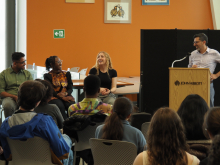Dean Salwa Karboune is please to announce the following appointments in the Faculty of Agricultural and Environmental Sciences:
Jessica Head
Director of the Morgan Arboretum and Molson Nature Reserve
Professor Jessica Head has been appointed as Director of the Morgan Arboretum and Molson Nature Reserve for a three-year term starting September 2025. Professor Head is an Associate Professor in the Department of Natural Resource Sciences.












